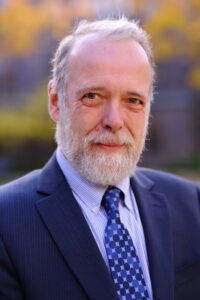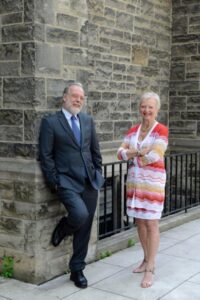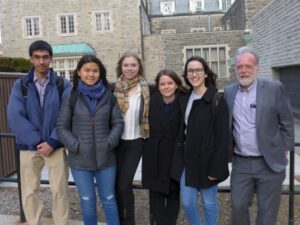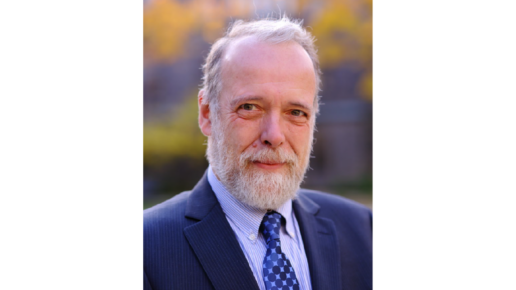Michael Ratcliffe is Trinity’s Dean of Arts and Vice-Provost, and Professor in the Department of Immunology at U of T. In June 2024, the soft-spoken Brit will wind up his impressive tenure as dean, but his impact on the College will be felt for years to come.
Advancing Trinity’s academic programs
 Vice-Provost and Dean of Arts since 2012, Ratcliffe also served as Interim Provost for a year during the transition to Provost Mayo Moran’s leadership in 2014, which has been “brilliant,” he notes. During his tenure as dean he navigated a wide range of situations, some listed on his job description, others not (the COVID-19 pandemic seems an obvious example of the latter, but as an immunologist, he more or less predicted it).
Vice-Provost and Dean of Arts since 2012, Ratcliffe also served as Interim Provost for a year during the transition to Provost Mayo Moran’s leadership in 2014, which has been “brilliant,” he notes. During his tenure as dean he navigated a wide range of situations, some listed on his job description, others not (the COVID-19 pandemic seems an obvious example of the latter, but as an immunologist, he more or less predicted it).
Among his many achievements at Trinity, he has been responsible for several innovative partnerships in the College’s academic programming over the past decade.
“I am proud of the continued development of the academic programs at Trinity,” Ratcliffe says, offering as examples three faculty appointments currently shared between Trinity and the Faculty of Arts & Science at U of T, which have further strengthened Trinity’s International Relations and Ethics, Society & Law programs. The first was the 2018 joint hiring, with the Department of History, of Cindy Ewing to a tenure-stream Assistant Professor position. Next were the joint appointments, with the Department of Political Science, of Assistant Professors Connor Ewing and Mark Nieman.
In 2019, Trinity launched the Integrated Sustainability Initiative, a partnership with the Faculty of Arts & Science and the School of the Environment at U of T that he has continued to develop over the years since, building faculty expertise in the area.
“There are no templates for these types of arrangements,” Ratcliffe says. “It’s all worked out on a case-by-case basis, and we’ve been able to attract some incredible faculty members for our students.”

A highlight of his Trinity career was the opportunity to work with alumna and donor Anne Steacy ’76 (1954-2021) to create two new science streams for the Margaret MacMillan Trinity One program: the Anne Steacy Biomedical Health Stream, and the Anne Steacy Medicine & Global Health Stream, both of which launched in 2014 along with the third- and fourth-year courses that form the Anne Steacy Program in Science Writing.
“It was just a delight to work with Anne,” Ratcliffe says. “She appreciated what we were trying to do, and understood our commitment to excellence. It was a true collaboration, building those programs from the ground up to ensure that we met not only the College’s goals for science programming, but also Anne’s personal goals for her Trinity legacy. We were both proud of what we created. And those streams have been incredibly popular with students and instructors alike.”
Contributing to immunology knowledge and research on a global scale
Ratcliffe’s leadership of the immunology department at U of T and nationally in the Canadian Society for Immunology have had a lasting impact on his chosen field. His research has furthered our understanding of how a specific type of white blood cell—B lymphocytes—produce antibodies. An expert in the evolution of lymphocyte development, he has published more than 100 papers in international journals.
In 2016, Ratcliffe celebrated the publishing of the 3,000-page, five-volume Encyclopedia of Immunobiology, 1st Edition, of which he is editor-in-chief. This comprehensive resource for university, research and medical libraries took more than three years to complete, and was at the time the largest integrated source of immunological knowledge available.
Living Trinity—building on a strong foundation
He is excited about the future of Trinity.
“Inspired by our students, we have made a commitment to sustainability as a College community,” he says. “The Living Trinity Campaign is enabling us to go from strength to strength, building on a foundation of excellence to become an innovative leader on the sustainability front.”
The new Lawson Centre for Sustainability will be a dynamic example of that innovation, he adds. “I am excited to visit campus and see all that the new building will become, especially for our students, who I think will benefit tremendously from its fully digitized classrooms and beautiful community spaces.”
An international career
Born and educated in the U.K., Ratcliffe spent threes year at the Basel Institute for Immunology in Switzerland and worked at University College London before McGill University called. Ratcliffe and his wife, Elizabeth (who is fluent in French), spent the next 15 years in Montreal. Both of their sons were born there. In 2001, U of T came calling, offering Ratcliffe the post of Chair of the Immunology Department. He spent 11 years there, in the process becoming a Fellow at Trinity. “I got to know people at the College, and I really enjoyed the mixture of intellectual expertise at Trinity,” he says.
Just as Ratcliffe was completing his second term as Immunology Chair, then-Dean of Arts Derek Allen was winding up his time at Trinity. He—and others—encouraged Ratcliffe to apply for the position, and that is how a scientist ended up as Trinity’s Dean of Arts. “Dean of Arts is a bizarre title for a scientist,” Ratcliffe acknowledges. And yet, it’s worked beautifully well.
“Professor Ratcliffe has been a transformative leader at Trinity, and it has been an honour to work with him,” Provost Moran says. “Among his many accomplishments, the increased strength of the College’s academic programs especially stands out. His ability to forge partnerships and realize opportunities brought new stability and outstanding faculty to the College.”
The next chapter

Stepping down as Dean of Arts doesn’t mean Ratcliffe is leaving campus just yet. While there is travel on the horizon with his wife, Elizabeth (top of their list is returning to Japan to continue their COVID-shortened explorations), and more time to spend with family, he is staying on for the 2024-25 academic year to teach his popular Trinity One course, The Art of Health Science Discovery, for one more cohort of students.
Also on the horizon is the family’s first grandchild, due to arrive just as Ratcliffe winds up his term in June.
When asked what he’ll miss the most about Trinity, he replies: “Working with superb colleagues—at Trinity, in the Faculty of Arts & Science and at U of T more broadly. There is so much knowledge, so much skill, so much quality among the people I’ve worked with. It’s really been a pleasure.”

